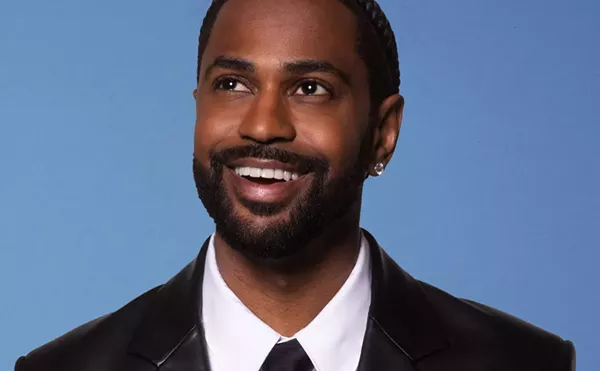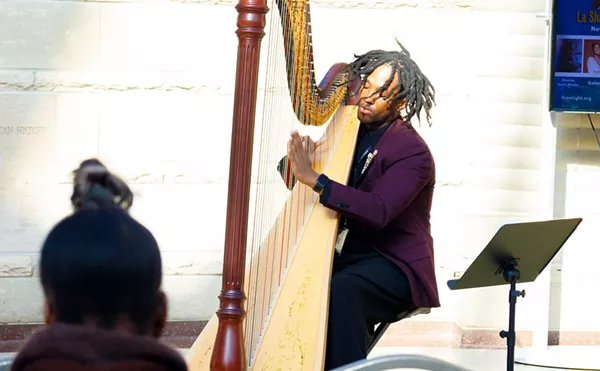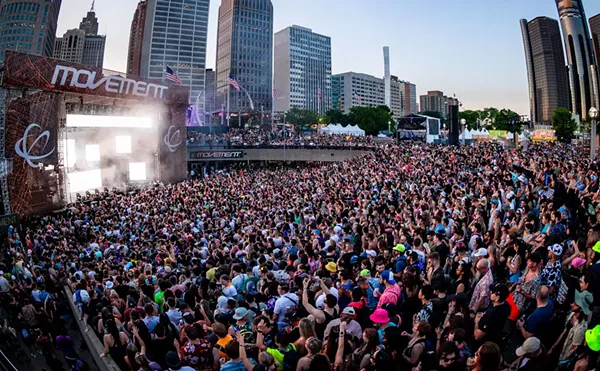Time keeper
Drummer Ali Jackson is the man in the hot seat, with the stories to prove it

Audio By Carbonatix
[
{
"name": "GPT - Leaderboard - Inline - Content",
"component": "35519556",
"insertPoint": "5th",
"startingPoint": "3",
"requiredCountToDisplay": "3",
"maxInsertions": 100,
"adList": [
{
"adPreset": "LeaderboardInline"
}
]
}
]

Tell him he looks cool up there, up on the risers in the back row of the most prominent big band of the era, Wynton Marsalis' Jazz at Lincoln Center Orchestra. Tell him he looks cool like, say, Papa Jo Jones with Basie or Sonny Greer with Duke. And he could give you some nonchalant malarkey about how it's no sweat — but he won't.
"Playing the drum chair in that orchestra is the hot seat. It may not seem like it. I heard a lot of people say that I look relaxed on the bandstand, but I'm not," Ali Jackson confesses. To borrow a phrase from another Detroit drummer, the late Roy Brooks, the pressure is all his.
Ali will tell you, too, what he went through for the job. Hired once, he was soon fired in the middle of a gig. But he had the gumption to come back, study up on what his replacement had that he didn't, so that seven years later he could reclaim one of the best drumming jobs in jazz — and keep it. "You need a lot of poise to play drums in a large ensemble. It's like being a quarterback: You are the leader."
His life has been intertwined with music from the beginning. His father was the late bassist Ali Jackson, also known as Ali Muhammad, part of the Jackson clan that includes the late vibraphonist Milt Jackson of the Modern Jazz Quartet.
The elder Ali Jackson lived for a time in New York and recorded in the late '50s with both saxophonists John Coltrane and Yusef Lateef on the Savoy label. Back in Detroit in later years, he helped train current jazz heavies such as drummer Gerald Cleaver, and bassists Rob Hurst, Rodney Whitaker and Jaribu Shahid.
As kids, Ali and his younger brother, Khalil, hung out with Dad in concert halls, at recreation centers — even busking on street corners. The elder Jackson was hell-bent that his sons follow in his footsteps. Meanwhile, their mother rounded out their musical education with piano lessons at home.
"It was always a blessing for me to be around music every day. I was able to listen in on my dad's rehearsals and his private lessons, just the whole gamut of music. I'm thankful that I grew up around all that music," Ali says by telephone interview from his home in West Orange, N.J.
In 1987, when his dad passed away, Ali and his brother lived with the McKinney family, known in jazz circles as the first family of Detroit jazz. Ali's musical education continued under the guidance of the clan's musical elders Harold, Ray, Kenneth and Bernard McKinney. (His mom lived in Hawaii in those years, and Ali said there were a multitude of personal reasons why her sons stayed in Detroit instead of joining her.)
Ali graduated from Cass Technical High School, and made quite a name around Detroit in the late '80s with the jazz group Legacy, which included his bro pianist Carlos McKinney, and saxophonist J.D. Allen. They toured Europe, and released a sweet debut album With You in Mind.
Legacy split in 1997. But each member had been building journeyman résumés outside of the group, and they'd continue to do so afterward. McKinney played with the great drummer Elvin Jones and saxophonist and native Detroiter Kenny Garrett. McKinney also became a sought-after R&B and hip-hop producer, producing tracks for Busta Rhymes, Babyface and Keyshia Cole.
Allen built a solid rep as a leading saxophonist and bandleader around New York, winning praise in The New York Times for "an enigmatic, elegant and hard-driving style." Khalil Jackson ultimately made his mark not in music but on Wall Street, and his older bro performed with vet swingers such as saxophonist James Moody, and trumpeter Harry "Sweets" Edison.
But after his move to New York, his first big gig was with trumpeter Wynton Marsalis' quintet. Ali also worked in Marsalis' Jazz at Lincoln Center Orchestra, subbing for drummer Herlin Riley. In 1997, Marsalis hired Ali full-time — for the first time, which didn't last long: "We did a thing with NPR. Wynton was the host of Making the Music, and they put together this big band of some of the great jazz musicians, Slide Hampton, Jon Faddis and Christian McBride. We were playing a complicated piece that required the drummer to be deliberate and to have a lot of command. I didn't have a lot of experience. Wynton stopped the rehearsal. He took me into the office and said, 'Hey, man, I have to send you home.'
"I was crushed. At the time, I had my girlfriend with me. I got on the train back to New York. The next day they did the session. I took my own money and I took the train back to D.C. in time for the session. I sat behind Herlin Riley the whole session. I watched and I learned what he was doing that I wasn't. He had something that I didn't have and I wanted to find out what that was."
Seven years later Marsalis gave the drummer another shot. In the interim, Ali gained more experience. He performed with vocalist Dee Dee Bridgewater. He played with the Lionel Hampton Big Band, and for two years, he held down the drum chair in the Mingus Big Band. He got married. He had two sons, Ali III and Aziel. He recorded three well-received albums, Grove at Jazz Entete and The Big Brown Get Down Vols. 1-2. When Marsalis rehired him in 2005, Ali was a more "poised" drummer.
"I wanted to be at the top. I wanted to change the vibe of every bandstand I was on without saying a word. It was like when Shaq was a dominant presence in the NBA. When he first came into the league, you just were intimidated when he walked on the floor."
Over his six years with the orchestra, Ali has taken on more responsibilities, including some writing and arranging. His side projects include hosting free bi-weekly clinics for interested young drummers in his New Jersey neighborhood. He's working on a rather ambitious album with saxophonist Joshua Redmond, guitarist Kurt Rosenwinkel and Marsalis. The drummer is also having a blast teaching his sons the ropes. They're playing instruments and hanging out at gigs with their dad.
Asked if he's mapped out his sons' musical future, Ali explains: "I'm different than my dad. My dad made me play. My sons are exposed to the music, but I don't make them play. I didn't have a choice. If they develop an affinity for the music, they have access to it, and they can hang out and listen to some of the greatest jazz musicians in the world."
Of course, that includes their dad as well.
Jazz at Lincoln Center Orchestra with Wynton Marsalis performs Wednesday, Feb. 2, at 8 p.m. at Hill Auditorium, 825 North University, Ann Arbor; 734-764-2538; ums.org. The concert is to include music from their newest disc, Vitoria Suite, celebrating the blues and music of the Basque region of Spain.





